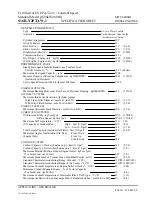
_04
2
11
2.3
2.4
TECHNICAL INFORMATION
EN
Those engines are designed for fuels in accordance with EN 590 and ASTM D975 for a cetane number of at least 45. Since
those engines are not equipped with exhaust gas after-treatment, they can be operated with diesel fuels with sulfur content up
to 500 mg/kg (ppm). Compliance with the emission requirements is guaranteed only with sulfur content up to 350 mg/kg (ppm).
Fuels with a sulfur content > 50 mg/kg demand a shorter lubricating oil change interval. This is set at 250hrs. However, the
engine oil must be changed when the Total Base Number TBN is reduced to 6.0 mgKOH/g test method ASTM D4739. Do not
use low SAPS engine oils.
NOTE:
In a warranty case the customer must prove by a certificate from the fuel supplier that an allowed
fuel was used.
2.5 Fuel
Important
• Use of other types of fuel could damage the engine. Do not
use dirty diesel fuel or mixtures of diesel fuel and water since
this will cause serious engine faults.
• Any failures resulting from the use of fuels other than
recommended will not be warranted.
Warning
• Clean fuel prevents the fuel injectors from clogging.
Immediately clean up any spillage during refuelling.
• Never store diesel fuel in galvanized containers (i.e. coated
with zinc). Diesel fuel and the galvanized coating react
chemically to each other, producing flaking that quickly
clogs filters or causes fuel pump and/or injector failure.
FUEL COMPATIBILITY
EN 590 (biodiesel content max. 7% (V/V))
ASTM D 975 Grade 1-D S15
ASTM D 975 Grade 2-D S15
NATO F-54, equivalent to diesel fuel in accordance with EN 590
EN 590 or ASTM D 975 Grade 1, 2 -D S15 Arctic Diesel
JIS K 2204 No. 1, No. 2
2.5.2
Biodiesel fuel
• Fuels containing 10% methyl ester or B10, are suitable for use in this engine provided that they meet the specifications listed
in the
Tab. 2.3
.
• DO NOT USE vegetable oil as a biofuel for this engine.
2.5.1
Fuel for low temperatures
• When operating the engine in ambient temperatures lower than 0 degrees C, use suitable low temperature fuel normally
available from fuel distributors and corresponding to the specifications of
Tab. 2.3
.
• These fuels reduce the formation of paraffin in diesel at low temperatures.
• When paraffin forms in the diesel, the fuel filter becomes blocked interrupting the flow of fuel.
BIODIESEL COMPATIBILITY
Biodiesel according to EN 14214 (only permissible for mixture with diesel fuel at max. 10% (V/V))
US biodiesel according to ASTM D6751 – 09a (B100) (only permissible for mixtures with diesel fuel at 10% (V/V))
2.5.3
Synthetic fuels: GTL, CTL, BTL, HV
It is a well-known fact that engines which are operated for longer periods with conventional diesel fuel and then converted
to synthetic fuels suffer shrinkage of polymer seals in the injection system and thus fuel leaks. The reason for this behavior is
that the aromatic-free synthetic fuels can lead to a change in the selling behavior of polymer seals.
Therefore, conversion from diesel fuel to synthetic fuel may only be done after changing the critical seals. The problem of
shrinkage does not occur when an engine was operated with synthetic fuel from the start.
ED0053032450
Содержание Kohler KDI 1903TCR-MP
Страница 1: ...KDI 1903TCR MP KDI 2504TCR MP OWNER MANUAL ...
Страница 5: ..._04 1 5 EN NOTES ED0053032450 ...
Страница 18: ..._04 3 18 SAFETY INFORMATION EN 3 6 Location of safety labels on engine ED0053032450 ...
Страница 51: ... _04 10 51 NOTES EN ED0053032450 ...
Страница 52: ... _04 10 52 NOTES EN ED0053032450 ...
Страница 53: ... _04 10 53 NOTES EN ED0053032450 ...
Страница 54: ... _04 10 54 NOTES EN ED0053032450 ...












































